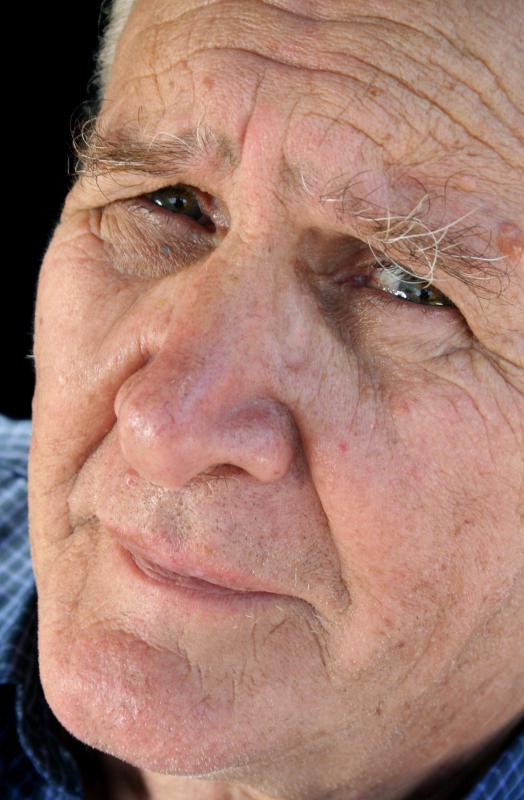At TheHealthBoard, we're committed to delivering accurate, trustworthy information. Our expert-authored content is rigorously fact-checked and sourced from credible authorities. Discover how we uphold the highest standards in providing you with reliable knowledge.
What are the Most Common Memory Loss Symptoms?
Most memory loss symptoms occur gradually and spring from any number of causes. Problems remembering dates and names, easily becoming lost, going out on errands and forgetting the purpose of them, and having difficulty correctly performing familiar tasks like driving or baking can all be signs of memory loss. While these symptoms can occur at any age, they are of somewhat more concern in the elderly, where they can indicate brain-affecting disorders like dementia and Alzheimer's.
With the specter of Alzheimer's disease lingering over aging people, many are frightened that any sign of memory loss can be the beginning of the end. What many do not know is that memory loss may be due to a variety of conditions, and may even be fully reversible. Understanding memory loss symptoms can help concerned patients, friends and family determine what conditions are likely and what memory loss symptoms may mean.

Memory loss affects the ability to make full and complete use of the brain. Some symptoms of memory loss may not involve actually forgetting things, like dates or names, but manifest instead in other related problems. Memory loss symptoms that may be related include mixing up words for objects, having difficulty making decisions, and being unable to follow conversations. The inability to solve simple work or household problems may also suggest that there is a problem.

The good news about memory loss symptoms is that they are often temporary and correctable. Memory loss can be caused by certain medications, heavy drinking or drug use, or injuries. Other causes include increased stress levels or sudden life changes, temporary illness, or even menopause. Psychological trauma can also affect the memory, causing people to remember events incorrectly or block them from memory completely.

Some memory loss can also be caused by brain cancer or tumors in or on the brain. Surprisingly, this frightening diagnosis is often treatable through surgical means or with radiation or chemotherapy. People who undergo successful treatment for brain tumors and cancer have the potential to regain total brain function.
Unfortunately, memory loss symptoms can also be indicative of more serious, incurable conditions. Currently, there is no cure for Alzheimer's disease or many forms of dementia, but symptoms may be controlled and even slowed through medication and therapy. With a loving support group and good medical care, even those permanently losing their memory can often lead happy lives. In order to begin proper diagnosis and treatment, however, anyone experiencing chronic or worsening memory loss symptoms should seek immediate medical attention
AS FEATURED ON:
AS FEATURED ON:
















Discussion Comments
Bhutan - I know that memory loss treatment can involve hypnosis or even art therapy.
With patients that suffer from dementia, art therapy is a good form of treatment because they can express themselves freely in the art and the therapist can ask them questions in order to help them understand and possibly improve their cognitive abilities.
They may also have family members bring scrap books so that the patient could be exposed to the past and possibly trigger some memories.
People with dementia do have moments of clarity so this option might also work.
Hypnosis is also great treatment option when the sudden loss of memory is due to a traumatic experience.
In this situation the subconscious mind is blocking out the painful memories as a coping mechanism.
Since a person in this state cannot verbalize the source of their problem, a psychiatrist through the use of hypnosis will be able to determine the source of the pain and create therapeutic treatment options as well as drug therapy in order to help the patient deal with their sudden memory loss.
I know that memory loss in old age in very common but if the memory loss is more profound meaning that the person continues to repeat the same thing and does not realize that they already made the same statement then it could be something more serious.
For example, my father was not able to remember the beginning of a ten minute conversation and continued to tell me the same thing he said in the beginning of the conversation as he did in the end.
If he were to tell me about a movie he saw, for example, he would initially tell me that he saw a particular movie and then a few minutes later he would reintroduce the fact that he saw this movie like if he had never mentioned it before.
He was diagnosed with dementia for this reason because his short term memory was beginning to erode.
There have been studies that have said that people that are active and exercise at least three times a week are less likely to develop this condition in old age.
It makes sense because after I workout I tend to feel more alert which probably makes my brain more active.
Post your comments